
The Unsustainable Truth About Recycled Polyester
It's the current trend in fast fashion that's been attempting to make us all feel a little better about buying new.
Recycled clothes
You take one step into a fashion store in town these days and you're immediately met with a barrage of feel-good material. Posters with images of clean nature. Green tags that proclaim clothes in this store are made responsibly and ethically; they're the "conscious" choice.
Recycled
That's the one you'll see a lot: "This item is made from recycled materials", and it makes you feel good. You're aware of overconsumption from the speed of fleeting trends and throwaway fashion, but if it's not going to waste then that is definitely a good convincer to keep buying.
Recycling clothes sounds like a great sustainable solution for the millions of tonnes of clothes that end up in landfills every year. But it's not as straightforward as it sounds. Especially when it comes to the fabric that takes up 70% of our wardrobe - Polyester.
Take a look in your wardrobe, or walk around any clothing store and check the labels. You'll find about 70% of the fabrics are polyester or a blend including it.
Fast-fashion companies are using the little thread of truth in the word recycled to weave a huge and unsustainable lie.
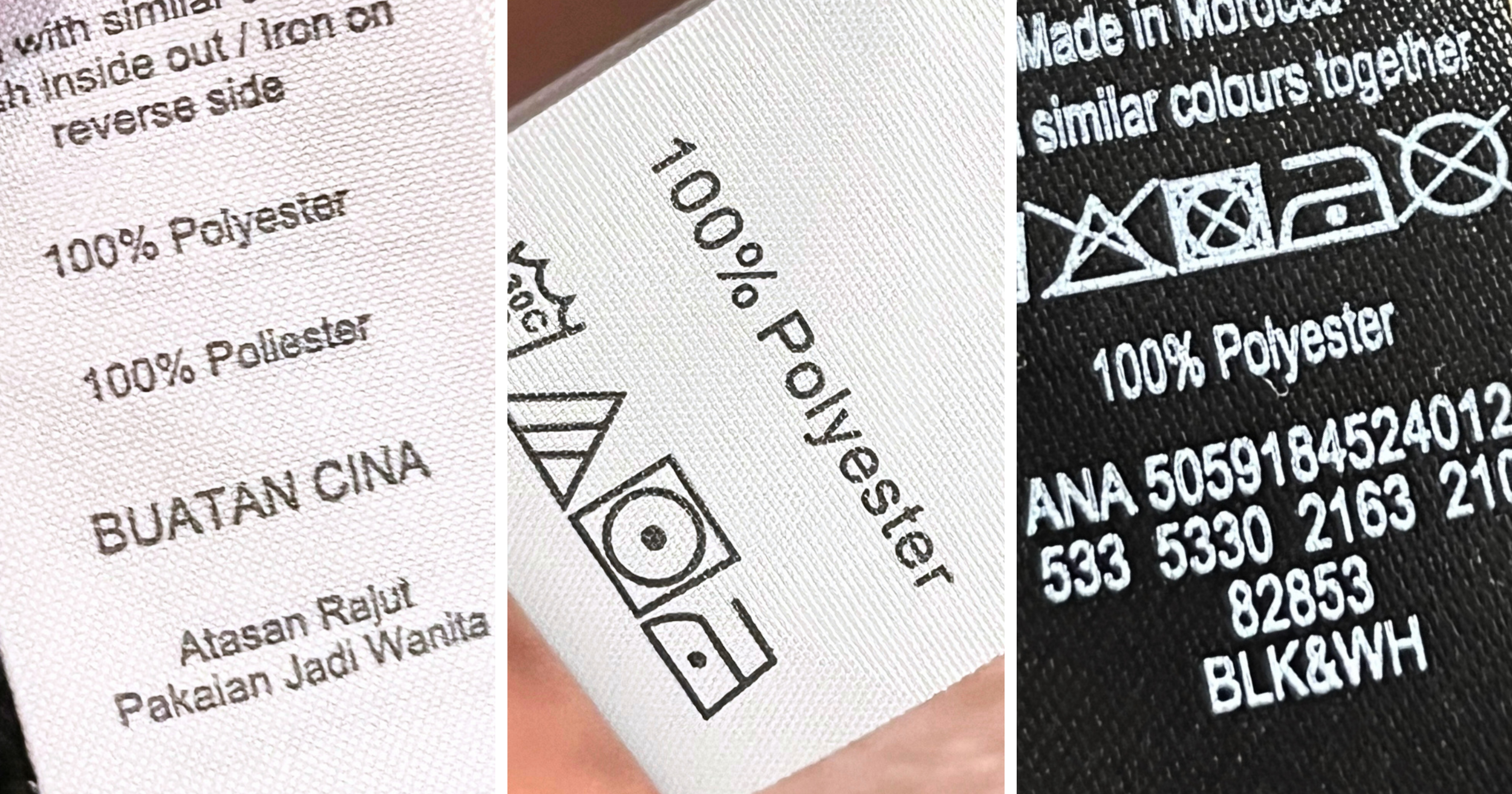
100% polyester labels from fast fashion clothes
The problem with all this polyester
Polyester is a plastic made from oil, just like a water bottle or all that throwaway plastic packaging. It is the exact same material woven into a fabric — the perfect disguise to keep clothes the acceptable face of excessive plastic waste.
A survey of Americans found that 69% don't know that their clothes are made from plastic. Whilst we're worrying about electric cars, paper straws, and reusable bags to reduce pollution and waste from fossil fuels, plastic clothes are slipping under the radar.
And the problem is that plastic, whether it's a bottle or clothes, doesn't decompose for hundreds of years. In fact, all of the plastic that's ever been made is still out there today.
Read more about the problem of polyester here.
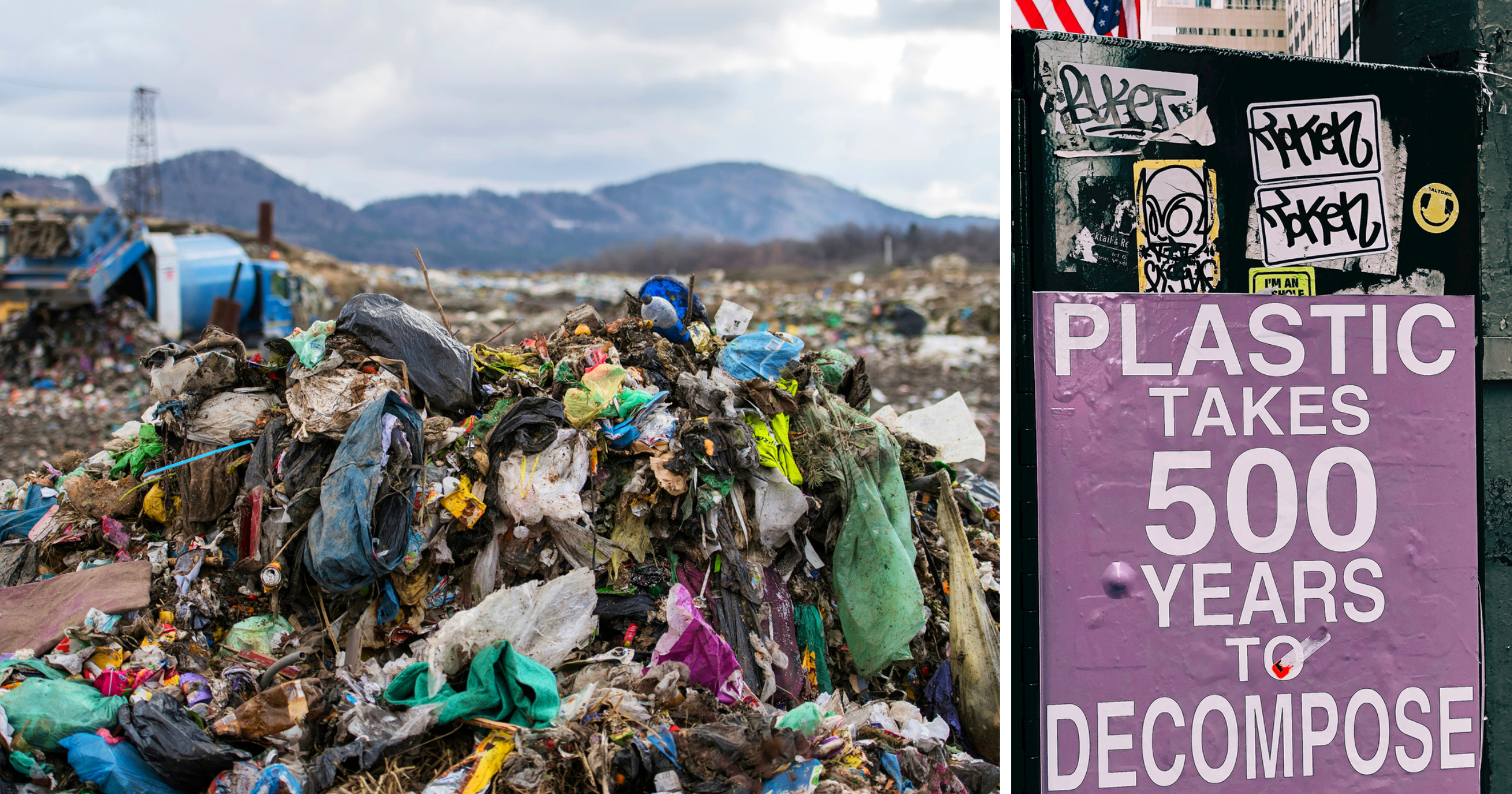
Plastic does not decompose, including polyester clothes.
What about recycled polyester clothes?
Fast-fashion brands know we're worried about sustainability. So to market themselves as sustainable, they focus on their use of recycled polyester.
I mean, it sounds great, right? Slap on some green labels or hearts to show you care, and it's pretty convincing that these clothes solve the polyester problem.
The issue is that it's all vague wordplay.

Fast-fashion clothing tags featuring recycled polyester prominently.
“Recycled” polyester isn’t made from your old, donated clothes
Recycled polyester, as used by brands like Adidas and Reformation, is recycled. Just not from old polyester clothes.
All of the recycled polyester currently sold by fast-fashion brands is actually made from plastic bottles.
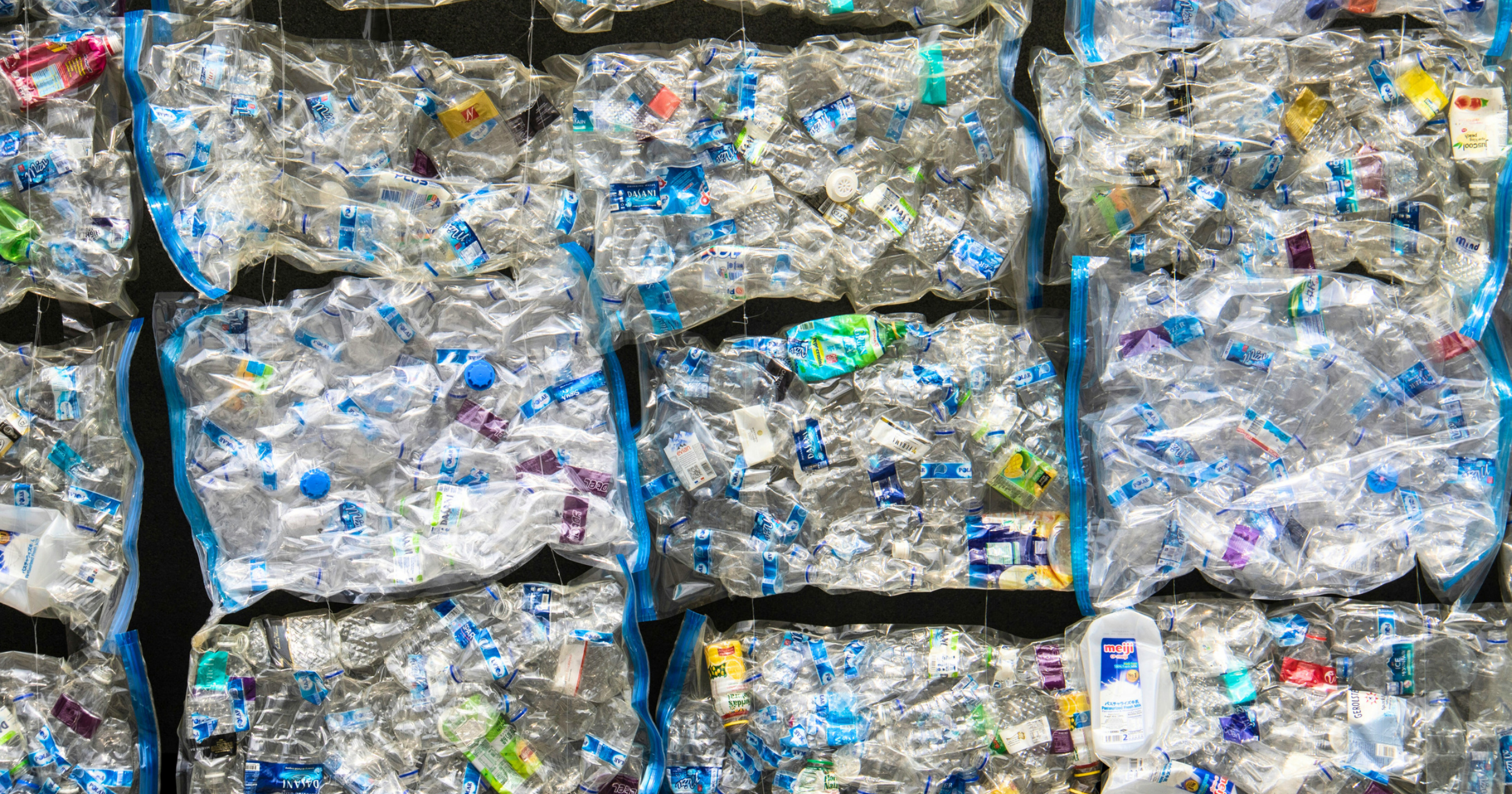
Plastic PET bottles on their way to being recycled.
But isn’t that just as good? Well, not really.
See, plastic bottles don’t have any trouble being recycled. Plastic bottles can be recycled into plastic bottles again and again and again. They are actually a closed loop of recycling that doesn't need to messed with.
What is closed-loop recycling?
Closed-loop recycling is the end goal of sustainability in manufacturing. It means that old products can be made into new products of the same type. Without needing resources from anywhere else.
Bottles into bottles, and textiles into textiles. Over and over again.

Closed-loop recycling.
But when a plastic bottle is melted down and spun into polyester, then made into clothing, that is the end of the recycling line for it. It can no longer be recycled again and again, which it could have been if it had stayed in its closed bottle recycling loop.
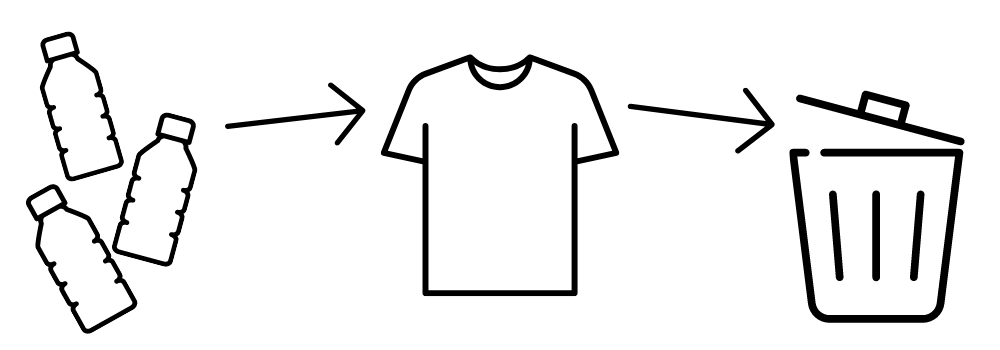
Actual polyester clothes are incredibly hard to recycle. But bottles are easy (and cheaper) to melt down and spin into polyester. By doing this, fast-fashion brands can still use the recycled label, even though it's not helping the environment at all.
All of those recycled bottles wouldn’t have ended up in landfills or at sea, they were already on their way to being recycled into more bottles. Now, they’ve been turned into another piece of unrecyclable clothing that will end up in landfills.
So why aren’t recycled clothes made from old clothes?
-
Most fabrics can’t be recycled
Currently, we only have the technology to close loop recycle 100% natural fiber fabric like cotton and cellulose-based materials.
And unfortunately, one of the companies making progress in this area, Renewcell, has just gone bankrupt. Despite initial interest from companies like H&M, the reality was that the process was just too new and expensive for fast-fashion to accept.
While there have been advancements made in recycling polyester and synthetic blends, the process is extremely restricted and not suitable to our current fashion market needs.
-
Polyester can only be recycled if it is 100% polyester
And even then, the outcome isn't pretty, and the factories able to do this are limited. Very few places are able to tackle it, and it comes with a large amount of waste.
One factory is able to completely closed-loop recycle 100% polyester textiles into new fabric, but only when the source is 100% polyester scraps from factories pre-consumer. This means not from actual worn or donated clothes. This is because the polyester needs to be uncontaminated by dyes and fixtures.
The resulting fabric they produce can only be black, as the slurry of melted polyester scraps is all different colors and cannot be dyed anything other than darker. This shows just how limited the concept of recycled polyester clothes really is. It simply won't work for the mass fashion market needs.
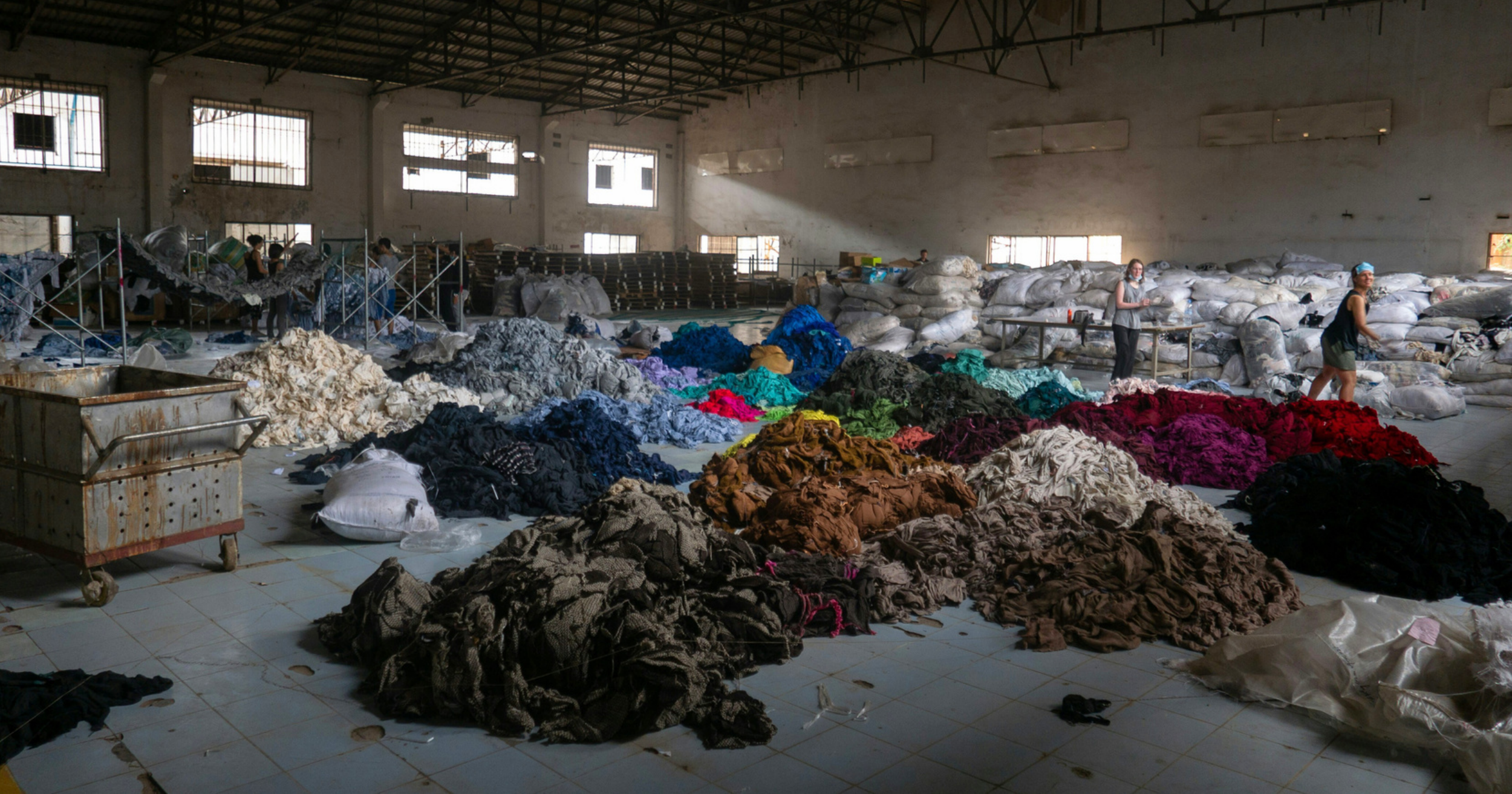
-
We can't recycle blended fabrics
Many clothing items are made from a blend of different fibers, such as cotton or elastane with the polyester. These blended fabrics are difficult to separate for recycling. So far, there just isn't a reliable method for it.
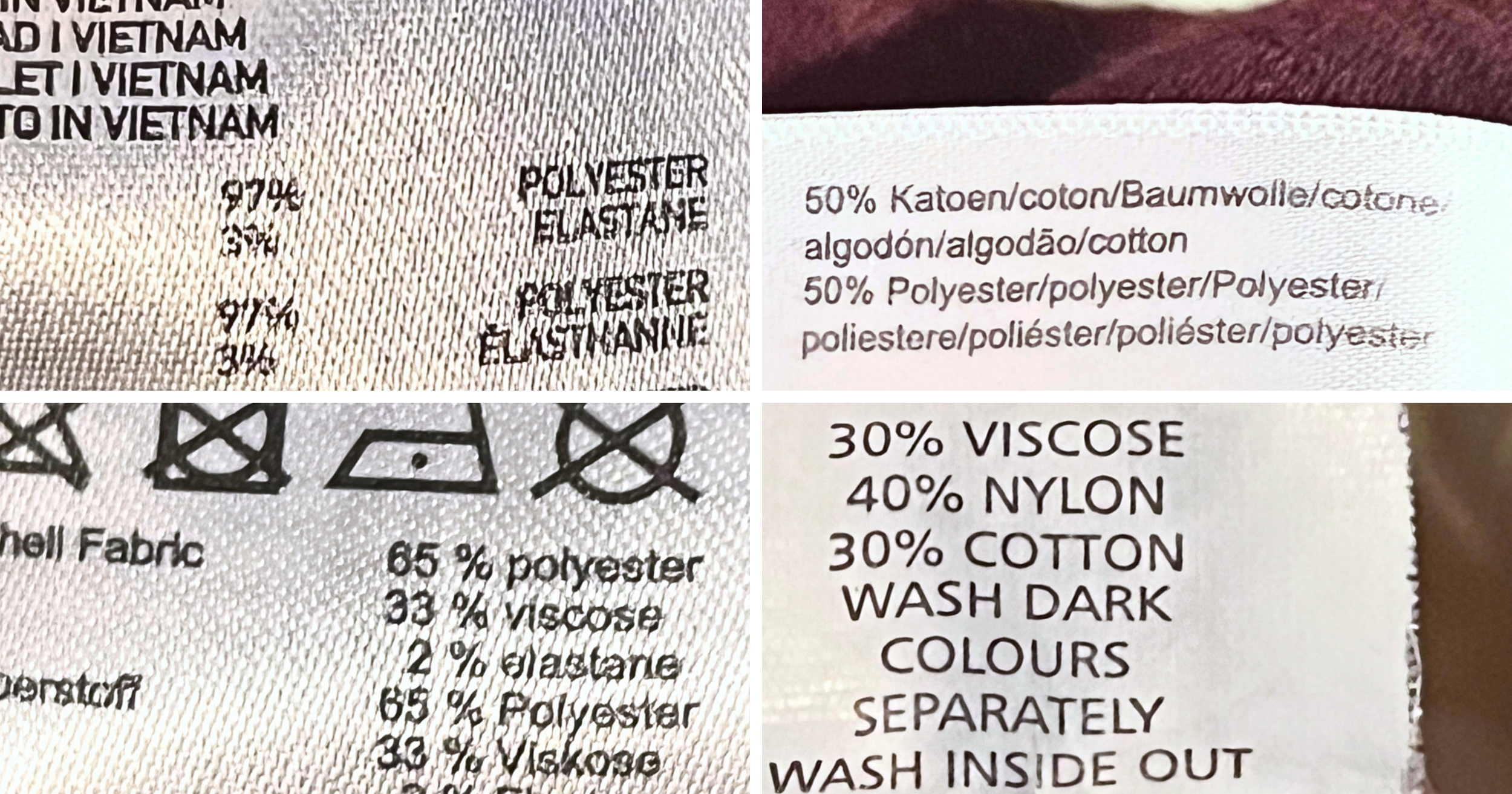
Examples of blended fabrics on clothing labels, none of these can be recycled.
While polyester takes up about 70% of our clothes, it's often blended with other fabrics. Making it just as environmentally unfriendly as any other unrecyclable material.

A misleading recycled polyester label on a garment made from a blended fabric. Not only is this not made from recycled polyester, it cannot be recycled after either.
-
Clothes are more than just plain fabric
Most fashion clothing undergoes chemical treatments, such as dyeing or finishing processes, which makes them unsuitable for recycling.
Polyester clothes are dyed, patterned, and adorned with fixtures such as buttons, zips, lining, embellishments, and of course, seams sewn with threads. All of this adds extra problems to the recycling process because the polyester is no longer pure.
-
There's a lack of infrastructure
In many parts of the world, the infrastructure for collecting, sorting, and processing recycled textiles is extremely limited, making it difficult to scale up clothing recycling efforts without huge investments in completely changing the industry.
When attempts have been made to do this, the production chain has not been able to adapt to the increased cost of this.
We do actually have the technology to close loop recycle some fabrics. Plenty of recyclable fabric ends up in landfills because the infrastructure is just not there to handle it. This is everything from the sorting process which often has to be manual, to the factories that can shred the fixtures from the fabrics and melt down the old stuff.
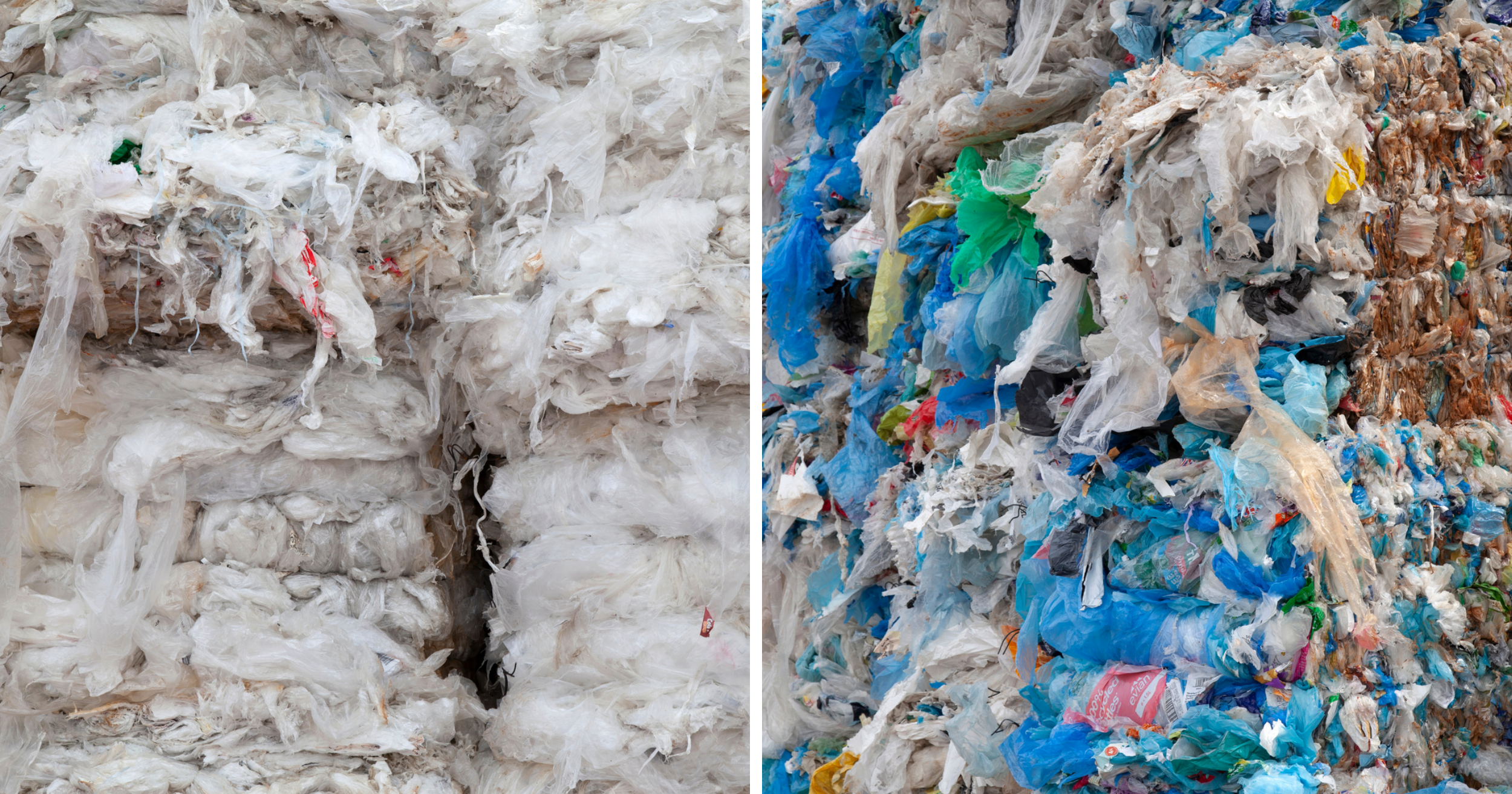
Scrap plastic sorted for recycling.
To scale it up to the point where it could supply fast-fashion retailers is simply too expensive for the big brands to even consider. All of it would require new suppliers, new production factories, new machinery for every stage, new logistics and much, much higher costs to the consumer. Throwing the whole cheap fast fashion ideal of brands like H&M straight out the window.
When synthetic materials are so cheap and a bit of recycled bottle greenwashing can do the trick to ease the guilty conscience, there isn’t much of a real push to change.
Are the sustainable polyester clothes in the room with us right now?
So, when you buy "recycled clothes" from a fast fashion brand, even the expensive ones like Reformation, with all their focus on recycling, you are not buying clothes recycled from old clothes. You are not even buying clothes that can be recycled into new clothes later.
This is not closed-loop sustainability. This is not circular fashion. And we are nowhere near to achieving it.
The 2024 Fashion Sustainability Report
The Remake 2024 fashion sustainability report revealed that the fashion industry is still far from changing its dependence on polyester. Out of the 52 companies assessed, the average accountability score for making sustainable and ethical changes was only 14 out of 150 points.
The report found that brands are overemphasizing the sustainability of their recycled clothing lines as a marketing tactic. In the report, it was found that no company demonstrated that it sourced recycled polyester transparently while also phasing out all materials that lack a closed-loop textile-to-textile solution.
But you wouldn't know that by looking at all the green "eco," "recycled," and "conscious" labels. Raw materials receive disproportionate attention in fashion sustainability simply because they are visible, easy for consumers to understand, and the most marketable "fix".
Maybe the sustainable recycled clothes are the friends we made along the way?
To put it into perspective, 400% more clothes are now produced than before, resulting in 100 billion new pieces of clothing every year.
And only 1% of that clothing is recycled.
Despite all the marketing and hype around recycled clothing, it barely exists in reality.
So what should we do?
Reduce > reuse > recycle
There is a reason for the order!
-
Reduce overconsumption of brand-new fast fashion
First, reduce the amount of fast-fashion or newly made clothing that you purchase. Find a style that you enjoy independently from trends. Step away from the exposure to fast-fashion marketing and influencer FOMO (fear of missing out) on social media, this is what leads to feeling like you need to buy into every new trend.
-
Reuse (rebuy and rewear) the clothes already out there
Then reuse (rewear) old clothes. It is, of course, not possible to suggest giving up on using polyester. We simply need the material for modern life. It is necessary for things like sports, swimming, and outerwear. But you can purchase secondhand when and where you can. Secondhand clothes are already produced and out there in the circular economy. When you buy secondhand, you not only keep something out of the landfill, but you also reduce the demand for new clothes that the fashion industry keeps track of. Rewearing is the only real way to recycle polyester clothes.
-
Recycle (upcycle, repurpose, resell, donate)
Recycling comes last because the unfortunate fact is that we simply cannot rely on it yet, or any time in the near future. But you can still give life to your old clothes. Upcycle or repurpose damaged clothes by giving them a new use. Resell clothes you no longer want on marketplace platforms, and donate to places where the clothes will be resold.
Because secondhand is the only sustainable choice, everything else is greenwashing.
Where can you buy secondhand clothes online?
At ThriftTale, we want to make fashion actually sustainable. We buy up discarded clothes and bring them back into the world for true circular fashion.
Our collection of vintage and secondhand clothes is packed with quality stuff that deserves a second chance at life. From designer brands to unique handmade vintage pieces, we're showing the world that you don't need to buy brand-new - you can be sustainable and stylish with secondhand.










